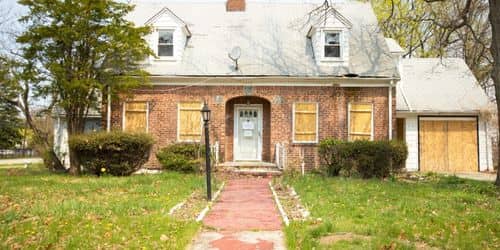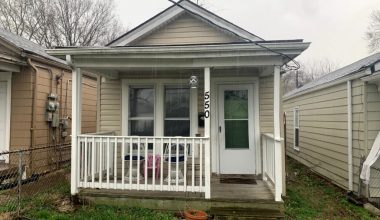You name it, bills, debts, and other sources of financial stress are just the tip of the iceberg that adds stress to daily life. Property distress is a direct result of these pressures. Situations where unanticipated circumstances force an individual or group to sell a property for less than they would want. Distressed properties refer to homes that are most often sold under pressure. Read on as this subsequent part of the article entails everything you need to know about distressed property sales and how to find one.
The Meaning of Distressed Property
We refer to a home that is about to go into foreclosure or that the bank already owns as a distressed property. Due to the chance to purchase a home at a reduced price, investors frequently look for these properties. Buyers, however, assume the risk that the house will require costly repairs. Distressed property sales might occur for one of three main reasons. Let’s examine each possibility in greater detail.
Distressed Property Sales
When a house, stock, or other asset needs to be sold fast, it goes through distressed property sales. When a seller sells their property in a distressed situation, they frequently lose money because they are under pressure to accept a lesser price. The majority of the time, the proceeds from these assets are utilized to cover debts, medical costs, or other unexpected needs. You should be aware of the following categories of distressed property sales: Foreclosures on bank-owned properties and short sales.
#1. Foreclosure
Through a legal procedure called foreclosure, a lender can force the sale of an asset that served as collateral for a loan in an effort to recoup the remaining balance owed from a borrower who has stopped making payments to the lender.
Types of foreclosure
There are numerous sorts of foreclosure, and they occur in the US, Canada, and many other nations. For instance, both are often utilized in the US by judicial sale and by the power of sale, although other methods are also legal in a few other states.
Judicial Foreclosure:
A court oversees the sale of the mortgaged property during judicial foreclosure, also known as a judicial sale. If they leave any funds over, we give them to the mortgagor/borrower after all other lien holders and mortgage holders have been paid.
Every state in the US has judicial foreclosure options, and many of them even demand it (Florida requires judicial foreclosure). By suing the borrower, the lender starts the legal foreclosure process.
During an (often brief) hearing in a state or local court in the US, they make a ruling following the exchange of pleadings.
A judicial officer, who also executes any necessary documents, such as a deed, oversees the sale. A judge from a higher court or a special referee chosen by a court of judicial privacy may carry out this task.
Nonjudicial Foreclosure:
Many states permit Nonjudicial foreclosure, also known as foreclosure by power of sale, where a deed of trust with a power of sale clause is utilized in place of an actual mortgage.
Nearly all ‘mortgages’ in several US states, notably Texas and California, are actually deeds of trust. This process entails the mortgage holder selling the property without a judge’s approval. In comparison to judicial sale foreclosure, this process is typically significantly quicker and less expensive.
Strict Foreclosure:
Due to their scarcity, other types of foreclosure are regarded as minor. If the mortgagee prevails in court under a strict foreclosure, which is permitted in a small number of states like Connecticut, New Hampshire, and Vermont, the court will force the delinquent mortgagor to pay the mortgage within a given time frame.
In the event that the mortgagor fails to do so, the mortgage holder acquires ownership of the property without being required to sell it. This sort of foreclosure is typically only an option when the debt exceeds the value of the property.
#2. Bank Owned Properties or Real Estate Owned (REOs).
A piece of real estate that hasn’t been successfully sold at a foreclosure auction is known as real estate owned (REO).
Lenders like banks own REOs. When a foreclosed property fails to sell for the amount needed to pay off the loan, a lender—often a bank or quasi-governmental organization like Fannie Mae or Freddie Mac—takes possession of it.
How Reos Process Occur
The pre-foreclosure phase of a mortgage default involves either a real estate short sale or a public auction frequently.
In the event that neither occurs, the foreclosure procedure may result in the lender—say, a bank—acquiring possession of the property. Without a real estate agent’s assistance, banks may try to sell the REO homes in their inventory.
When this occurs, banks frequently list their REO homes on their websites. Customers looking for homes may also receive information about REO properties in a bank’s portfolio from loan officers.
Professionals in REO
An REO specialist who markets the properties carries the management of a bank’s REO properties out, evaluates any offers, creates regular reports on the portfolio’s status, and locates deeds.
#3. Short Sales
In real estate, a short sale occurs when a property is put up for sale for less than what we owe on the mortgage of the present owner.
A short sale typically occurs when a homeowner is in financial difficulty and has to sell the home quickly to avoid having the mortgage company foreclose on it.
In a short sale, the lender receives the entire profit. The lender can then forgive the outstanding sum, or they can file a deficiency lawsuit and ask the ex-homeowner to make up the difference in full or in part.
How Short Sales Works
The most common scenario for short sales is when a homeowner has fallen behind on one or more mortgage payments and is in dire financial straits. There may soon be foreclosure procedures.
Additionally, they are more likely to happen during a downturn in the housing market, such as the financial crisis of 2007–2009, which saw a decline in property values and a slowdown in sales across many regions.
For instance, if property values decline, a homeowner can end up selling a home for $150,000 with a $175,000 mortgage balance still owing. The $25,00 difference.
How to Find Distressed Property; Tips and Tricks
When you begin searching for a distressed property, knowing what to find or look for is essential. One or more of the primary signs that a property may be in trouble is:
#1. Most Current Sale Price
Although home prices are increasing in the majority of U.S. real estate markets, this does not guarantee that prices won’t occasionally go back. When property prices begin their usual downward cycle, buyers who made their purchases at the peak of the market are frequently the ones who are most eager to sell.
Buyers who overpaid for their house might be struggling to make ends meet and may be willing to sell.
#2. Mortgage Amount
The current mortgage payment that the home’s owner must make can likewise be estimated using the sales price. Buyers occasionally put as little money down as possible in competitive real estate markets where prices are rising quickly, leading to large monthly mortgage payments.
A well-capitalized investor may find a pre-foreclosure or short sale opportunity if the economy starts to slow down and some owners find themselves unable to make ends meet.
#3. Outward manifestation
When searching for indications that a property is in crisis, first impressions are important.
A house is distressed if it exhibits any of these traits. Residences in which the lights are not on at night. Houses with weed-filled yards, broken windows, and fading paint. Unread newspapers or unsolicited letters. Notices affixed on windows and doors.
Homes that stand out from the other houses on the block because they are generally in
poor condition.
#4. Life-changing incidents
Property can occasionally become distressed for causes that are out of the owner’s control. Anybody can experience life-changing occurrences like a job loss, divorce, or death.
People may not be able to bear the responsibility of home ownership in circumstances like these due to emotional or financial difficulties. Despite the possibility of deals, investors should take care to come across as sympathetic. They may reject even the fairest offers from buyers who appear overly eager to profit at the seller’s cost.
Where Can You Find Distressed Properties
The next stage is to locate distressed properties now that you are familiar with their appearance. To find a distressed property you need to employ help from/by:
#1. Brokers in Wholesales:
Wholesalers are professionals at locating properties that are under market value, placing the distressed property under contract, and then looking for an investor like you to assign the contract to.
They already persuaded the owner to sell after searching the market for the greatest
Bargains. All you have to do is do your homework and confirm that the numbers add up before taking over the contract.
We can consider a tiny assignment fee that you must pay to a real estate wholesaler as a small amount to pay for a fantastic real estate wholesale bargain.
#2. MLS:
Another useful tool for finding foreclosed properties is your local multiple listing service. Request that your real estate agent looks for homes that have been listed more than once, for sale more than once, or that have expired listings.
Distressed Property websites: The following websites can help you find or locate distressed properties:
Properties in the US.
- Bid on the City
- CarProperty.com
- Curbed
- Domania
- Forsalebyowner.com
- Homes.com
- HomeServices of America
- Internet Listing Display
- LiquidSpace
#3. Real Estate Auctions:
If a lender forecloses on a home but is unable to sell it directly,
REO property is frequently sold at an auction.
Your neighborhood newspaper and websites for real estate auctions like Auction.com
both publicize property auctions.
#4. Association with lawyers:
Foreclosed homes can often be found by consulting attorneys who focus on real estate foreclosures, probate, or family law. Building a rapport with a lawyer takes time, but it might be worthwhile.
When distressed properties become available because of occurrences like a financial crisis or divorce, having a network of lawyers can give you the inside scoop
Advantages and Disadvantages of Distressed Properties
Let’s take a look at some of the advantages of distressed properties.
- Prices frequently fall short of the market.
- Excellent chance for immediate equity.
- Cheap starter home in a community that might otherwise be out of reach.
- When purchasing an REO straight from the bank, financing could be simpler.
When purchasing the ideal distressed home in the ideal location at the ideal time, there is the potential for astronomical gains.
Disadvantages of distressed properties
- The real cost of purchasing a distressed house may climb due to unforeseen repairs.
- In some markets, competition can raise values for REO and short-sale properties.
- If you want to close a deal right away, buying distressed property may cost a lot of cash.
- When purchasing bank-owned real estate at an auction or straight from a lender, title insurance may be challenging to get.
Conclusion
For certain real estate investors, it takes more time and effort to find a distressed home than it does to buy a turnkey rental, but the extra work could be worthwhile.
When you know where to find and what to look for, distressed property sales can be a wonderful source for deals, even though they aren’t suited for all investors.
Distressed Property FAQs
Where Can You Find Distressed Properties?
Nevada’s Las Vegas-Paradise. By far the largest percentage in the nation, 41% of all house sales in Las Vegas were foreclosure auction sales and distressed sales.
What does distress value mean?
Distress value is the amount you will sell the house right away.






